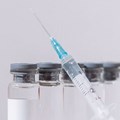Release of first plant-based coronavirus vaccine imminent

This is the latest announcement from GSK and Medicago - a pharmaceutical company headquartered in Quebec City.
The placebo-controlled study has been undertaken in over 24 000 subjects (adults 18 years and above) across six countries.
Superior efficacy rate
The overall vaccine efficacy rate against all variants of SARS-COV-2 was 71%. The vaccine candidate demonstrated efficacy of 75.3% against Covid-19 of any severity for the globally dominant Delta variant. The frequency of mild fever was low, even after the second dose.
Full results of the Phase 3 study will be released in a peer-reviewed publication as soon as possible.
Based on these results, Medicago will imminently seek regulatory approval from Health Canada as part of its rolling submission. The vaccine candidate is not yet approved by any regulatory authority.
The Omicron variant was not circulating during the study.
No serious adverse events
During the study, no related serious adverse events were reported and reactogenicity was generally mild to moderate and transient; symptoms lasting on average only one to three days.
“This is an incredible moment for Medicago and for novel vaccine platforms. The results of our clinical trials show the power of plant-based vaccine manufacturing technology. If approved, we will be contributing to the world’s fight against the Covid-19 pandemic with the world’s first plant-based vaccine for use in humans,” said Takashi Nagao, CEO and president at Medicago.
“I want to thank everyone who participated in our clinical trials, our collaborators at clinical trial sites, our partners at GSK, the Government of Canada and Government of Quebec, all of our employees and Mitsubishi Tanabe Pharma Corporation, for their commitment to advancing vaccine science when the world needs it.”
20 years' experience
Medicago has been developing its plant-based technology for the past 20 years, using unique technology to produce Virus-Like Particles (VLP) for its protein vaccines. VLPs are designed to mimic the native structure of viruses, allowing them to be easily recognised by the immune system. Because the VLPs lack core genetic material, they are non-infectious and unable to replicate. VLP vaccines developed by other technologies have traditionally been used worldwide for more than 30 years.
“I am pleased to see our vaccine candidate moving forward and bringing to the world the first plant-based vaccine against Covid-19, diversifying the pool of vaccines available to help improve public health and protect more people,” said Yosuke Kimura, chief scientific officer at Medicago.
Medicago has initiated the regulatory filing process for the adjuvanted plant-based Covid-19 vaccine candidate with the FDA (US) and the MHRA (UK). Preliminary discussion is underway with the WHO for preparation of the submission. Medicago has also initiated a Phase 1/2 trial in Japan which it plans to submit for regulatory approval in combination with the Phase 2/3 global study results early next year.
.
Related
Ipelegeng (Ipi) Thibedi joins Ogilvy South Africa’s as group managing director 11 Mar 2025 Award-winning kidney specialist leads the fight against youth dialysis rates 10 Mar 2025 Morocco reports first Mpox case 13 Sep 2024 Pharmacists International Federation: Global vaccine supply in the balance 4 Sep 2024 Ramaphosa to oversee signing of Presidential Health Compact 13 Aug 2024 Congo authorities approve mpox vaccines to try to contain outbreak 1 Jul 2024
























